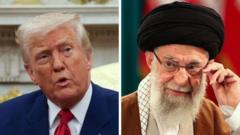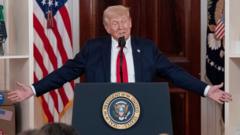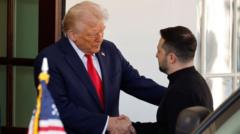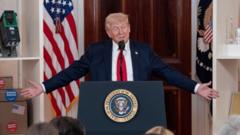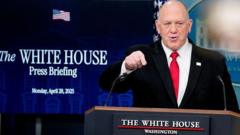In his first 100 days, President Trump's approach to global diplomacy has alienated allies and unsettled rivals, indicating a departure from established norms and raising concerns about America's role on the world stage.
Turbulence in Diplomacy: Trump’s First 100 Days Recast Global Relations

Turbulence in Diplomacy: Trump’s First 100 Days Recast Global Relations
President Trump's second term sees foreign policy characterized by chaos and demands reflecting a new era of transactional governance.
In the early hours of a Munich morning, Vice President JD Vance's aide urgently sought a senior Ukrainian official to finalize a deal regarding the extraction of valuable minerals from Ukraine. This bizarre scenario encapsulates the new approach under President Donald J. Trump’s second term: a foreign policy marked by unpredictability, exploitation, and transactional negotiations. Such dealings have clearly shaped American diplomacy during Trump's initial 100 days in office.
These early moments have sparked concern among allies and adversaries alike as the administration's chaotic engagements—long characterized by robust alliances—appear to tear down established international norms. The recent mineral deal serves as a prime example of a broader pattern characterized by unilateral demands and a host of tensions involving NATO, the global trading landscape, and various diplomatic relationships.
As the United States embarks on this unprecedented new phase in its foreign relations, observers note that traditional structures of global order are under increasing threat. From changing troop deployments in Europe to retaliatory tariffs impacting U.S.-China relations, fears abound regarding the implications for America's standing in an increasingly interconnected world.
Through vivid accounts and behind-the-scenes insights, it becomes clear that Trump's first 100 days have not only redefined his administration but may also leave lasting impacts across the globe. Allies and foes predictably adapt to this bold and, at times, reckless diplomatic strategy, as they scramble to navigate the rapidly shifting landscape of international politics in the wake of America’s transformed role.
These early moments have sparked concern among allies and adversaries alike as the administration's chaotic engagements—long characterized by robust alliances—appear to tear down established international norms. The recent mineral deal serves as a prime example of a broader pattern characterized by unilateral demands and a host of tensions involving NATO, the global trading landscape, and various diplomatic relationships.
As the United States embarks on this unprecedented new phase in its foreign relations, observers note that traditional structures of global order are under increasing threat. From changing troop deployments in Europe to retaliatory tariffs impacting U.S.-China relations, fears abound regarding the implications for America's standing in an increasingly interconnected world.
Through vivid accounts and behind-the-scenes insights, it becomes clear that Trump's first 100 days have not only redefined his administration but may also leave lasting impacts across the globe. Allies and foes predictably adapt to this bold and, at times, reckless diplomatic strategy, as they scramble to navigate the rapidly shifting landscape of international politics in the wake of America’s transformed role.

